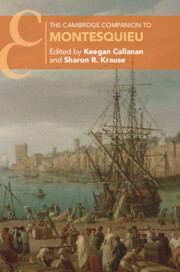Book contents
- The Cambridge Companion to Montesquieu
- Other Volumes in the Series of Cambridge Companions
- The Cambridge Companion to Montesquieu
- Copyright page
- Contents
- Contributors
- Acknowledgments
- Chronology
- Abbreviations
- 1 Montesquieu
- 2 Persian Letters
- 3 Considerations on the Romans
- 4 The Spirit of the Laws
- 5 Montesquieu and the Classical World
- 6 Montesquieu’s Guiding Principles and Foundations
- 7 Montesquieu on Virtue
- 8 Internationalism, Cosmopolitanism, and Empires
- 9 Liberty in Montesquieu
- 10 Political Sovereignty in Montesquieu
- 11 Montesquieu on Slavery
- 12 Montesquieu and the Liberty of Women
- 13 Political Economy
- 14 Religion and Politics
- 15 Constitutional History
- 16 Montesquieu and the Enlightenment
- 17 Montesquieu’s Liberal Legacies
- Bibliography
- Index
- Other Volumes in the Series of Cambridge Companions
4 - The Spirit of the Laws
Published online by Cambridge University Press: 23 February 2023
- The Cambridge Companion to Montesquieu
- Other Volumes in the Series of Cambridge Companions
- The Cambridge Companion to Montesquieu
- Copyright page
- Contents
- Contributors
- Acknowledgments
- Chronology
- Abbreviations
- 1 Montesquieu
- 2 Persian Letters
- 3 Considerations on the Romans
- 4 The Spirit of the Laws
- 5 Montesquieu and the Classical World
- 6 Montesquieu’s Guiding Principles and Foundations
- 7 Montesquieu on Virtue
- 8 Internationalism, Cosmopolitanism, and Empires
- 9 Liberty in Montesquieu
- 10 Political Sovereignty in Montesquieu
- 11 Montesquieu on Slavery
- 12 Montesquieu and the Liberty of Women
- 13 Political Economy
- 14 Religion and Politics
- 15 Constitutional History
- 16 Montesquieu and the Enlightenment
- 17 Montesquieu’s Liberal Legacies
- Bibliography
- Index
- Other Volumes in the Series of Cambridge Companions
Summary
The first goal of the chapter is to establish that Montesquieu was as much a moral philosopher as a political theorist, as is revealed in numerous discourses, dissertations and dialogues only recently translated into English. His purpose in writing The Spirit of the Laws, he remarked in his “Preface,” was to provide reasons for loving one’s “duties” while encouraging readers to “practice the general virtue that includes love of all.” In a discarded fragment of his “Preface” he even termed his work “a treatise on morality.” A second goal of the chapter is to establish that Montesquieu was critical of the political virtue he attributed to the republics of antiquity and to explain that the grounds for his rejection of Lycurgus’ Sparta have not previously been sufficiently explained. And, finally, the chapter analyses why Montesquieu strongly preferred the principle of honor motivating monarchical subjects, as compared to the political virtue of the ancients, which he likened to the hardships monks endure. Most revealing is his remark in a text Robespierre unfortunately failed to heed that “even virtue is in need of limits.”
Keywords
- Type
- Chapter
- Information
- The Cambridge Companion to Montesquieu , pp. 54 - 75Publisher: Cambridge University PressPrint publication year: 2023

